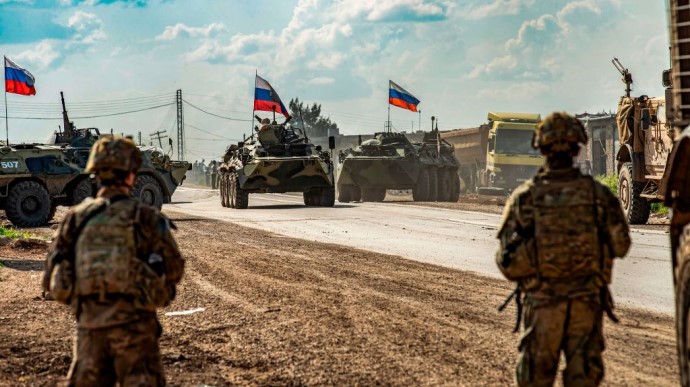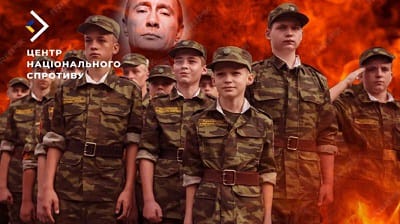Russian media summarise the main problems that Russian service personnel complained about from February to July

UKRAINSKA PRAVDA – WEDNESDAY, 24 AUGUST 2022, 14:46
Russian mass media has published the complaints of Russian soldiers in Ukraine and their relatives received from February to July, in particular regarding the interference of PMC Wagner [a network of mercenaries who serve as the de facto private army of Russian President Vladimir Putin – ed.] in the activities of the army and covert mobilisation.
Source: [Latvia-based Russian media outlet] Meduza referring to the reports of the Soldiers' Mothers of Russia movement
Details: Every month, these human rights defenders have compiled reports in which they record the most important appeals received from military personnel and their relatives. During the six months of the war against Ukraine they have received about 400 appeals.
Judging by the reports of the human rights defenders, in February-March, the main problem of the Russian military in Ukraine was the lack of communication. During these two months, the organisation received 145 appeals, most of which came from relatives of professional soldiers. However, after 24 February, conscripts also stopped being in touch [with their relatives].
Quote: "Although the families of professional soldiers, taking into account the data from the report, had at least some idea about the direction of their relatives’ movements (in this regard, as a rule, the information trail ended in Belgorod, Russia, in Belarus or in Crimea), the relatives of the conscripts knew only the starting point – the military unit, where their relative served."
Details: According to the report, many servicemen stopped communicating with their families even before 24 February. In their appeals, many relatives reported that their relatives were mobilised despite serious health conditions.
Media outlets are publishing some of the appeals of relatives:
- "The mother of a conscript from Yoshkar-Ola. He served in the motorised rifle regiment in the village of Kalininets near Naro-Fominsk [Russia]. Between 17 and 20 February, he called from Belgorod [Russia] and said: ‘They’ve given me a machine gun, I am being taken to war.’ There was no more information about her son, no communication with him."
- "The mother of a conscript from Karelia. The son was called up with a diagnosis of ‘funnel-shaped deformation of the chest’. During his service, he developed breathing problems and pain in the spine due to exertion. He was hospitalised in the village of Agalatovo, Leningrad Oblast [Russia]. It is recommended that he be reviewed by a military medical commission. District military clinical hospital #442 refused to allow the serviceman to be reviewed by a military medical commission."
- "The brother of a military man who served in the village of Kamenka, Leningrad Oblast [Russia]. On 23 February, the relative was in touch for the last time, then there was no communication for more than a week. At the beginning of March, an unknown woman sent a video to the appellant, in which his brother reported that he was in a village in Kharkiv Oblast [Ukraine] without documents."
- "The mother of a professional soldier from Novosibirsk Oblast. The son was drafted in November and signed a contract in February. He was hospitalised with a shrapnel wound in the city of Valuyki, Belgorod Oblast [Russia]. On the night of 14 March, the military came to the hospital and took the soldier to an unknown location."
In April, the main problem was the impossibility of leaving the army and threats in the event of discharge. This month, the human rights defenders received 47 appeals.
Professional soldiers began to sign early dismissal reports. Relatives of conscripts reported that the soldiers were being psychologically pressured and forced to sign contracts. In some cases, contracts were signed without the knowledge of conscripts.
- "The mother of an 18-year-old college student from St. Petersburg. On 25 April, at 09:30, the doorbell rang. She opened it to find a person in a Russian Guards uniform [The National Guard of the Russian Federation or Rosgvardiya is the internal military force of Russia] and another in civilian clothes. The Russian Guardsman did not allow the door to close, putting his foot in it. He was kicked out, but then they found in the gap between the wall and the door a summons with a demand to appear on 28 April for a medical examination."
- "The mother of a conscript from St. Petersburg, Russia. The son was in a training unit in the city of Kovrov, Vladimir Oblast [Russia]. He was being prepared for deployment. They woke him up in the middle of the night and made him sign a contract. Military card in his hands, passport is at headquarters."
- "The wife of a professional soldier from Budyonnovsk. In Ukraine, her husband was blown up by a landmine and was injured. He has head pains. They are not providing medical assistance."
- "Mother of a serviceman from Leningrad Oblast. He was last in touch on 23 February. Fellow servicemen said he had died. According to them, only 15 people out of the 40 in his unit survived."
In May, military personnel and their relatives often complained about the punishment meted out for refusing to participate in hostilities. In particular, soldiers were subjected to violence for "desertion" (the refusal to obey an order). 39 appeals were received during this month.
- "The mother of a serviceman. The son was the only one left alive out of the entire company. He spoke about the threats received by the soldiers from the command and how 54 people were kept in a basement near Donetsk [Ukraine]. He left the scene of hostilities. The mother contacted Pavel Chikov, the head of Agora [the human rights organisation in Russia that works on high-profile cases of human rights violations]."
- "Military serviceman from Chechnya [Russia]. He was wounded on 24 February. The service conditions are unbearable – there is no food and water, no compensation, no opportunity for rest and recuperation. 20 people remained in action out of the entire battalion. He wrote a refusal to further participate in hostilities due to family circumstances, psychological state and beliefs. Fired for violation of contract. His military card does not have any mention of participation in hostilities."
- "Wife of a serviceman from Karachay-Cherkessia. The husband serves in South Ossetia. Six people out of the 300 in the battalion survived. They were supposed to be sent to the war zone again, but they refused. The command said that they were deserters, kept them in the basement in the ‘DPR’ [the self-proclaimed Donetsk People’s Republic – ed.] Then they released them because they agreed under pressure to go where they were sent. On 5 May, they were taken to the Kuzminsky training ground in Rostov Oblast [Russia]."
- "The mother of a conscript from Astrakhan [Russia]. The son is serving in Buynaksk [Dagestan, Russia]. He was beaten up by another soldier. Second-degree kidney failure."
In June, there were frequent complaints of physical and psychological violence, as well as extortion in the army. Complaints about violations of the draft procedure, including mobilisation despite poor health and the exacerbation of illnesses, also continued to be received. Taking into account the reports, there was persecution based on nationality. In June, the Soldiers' Mothers movement received 35 appeals.
- "The mother of a military serviceman from St. Petersburg. The son has sight and heart problems. He was treated at the Almazov Institute in St. Petersburg. The district military commissariat declared him unfit for service, but the city conscription commission declared him fit for service. The son is serving under the draft in the Greater Moscow Region. During his service, his health deteriorated. At first they sent him to hospital, but then they decided to return him to the unit, without a review by a military medical commission."
- "The mother of a conscript. The son is 20 years old, drafted in Sevastopol (annexed by Russia in 2014). Weekly extortion: 500 roubles [approximately $8 US dollars] – ‘for chevrons’, 200 roubles [approximately $3 US dollars] – on Russia Day, 200 roubles [approximately $3 US dollars] – 1for underwear1. The son writes from his mobile number, but asks for money to be transferred to another number."
- "Conscript. He reported that his friend, also a military serviceman, is in a hospital somewhere in the Krasnoye Selo area near St. Petersburg. He writes, ‘the military unit was actually captured by Dagestani servicemen. They demand that we bring alcohol, phones. And if not, they would beat and choke us to death’."
- "The mother of a conscript from St. Petersburg. The son serves in the village of Mga, Leningrad Oblast [Russia]. He is fitness category B4. The lieutenant beats the soldiers with a bat, uses drugs. But the phones of the new arrivals are not taken away. A week after the start of the service, the son wrote to his mother: ‘It is impossible to bear. I will kill myself!’."
The main problem in the Russian army in July was the intervention of PMC Wagner in the activities of the regular troops.
According to the Soldiers’ Mothers, PMC Wagner mercenaries were assigned to monitor the soldiers who filed reports. Complaints about violence from the command continued. In some cases, after being dismissed at their own will, servicemen were simply locked in one room for a long time. In total, 50 appeals were received during this month.
- "Officer's wife. On 16 July, he and two other officers refused to perform a combat mission and wrote reports for dismissal. In this regard, the ‘LPR’ [self-proclaimed Luhansk People’s Republic] called the military police. The officers were handcuffed and taken to the commandant's office. Then they were handed over to PMC Wagner. There is no further communication."
- "The mother of a conscript from Karachay-Cherkessia. The son is serving in Irkutsk Oblast [Russia]. He complained that he was told that ‘he didn't prove himself’, after which they took him somewhere, ‘mentally and physically abused him, and almost killed him’. The further fate of the soldier is unknown."
- "The mother of a serviceman from the city of Sosnovy Bor, Leningrad Oblast. The son has already completed his service. A summons came with a demand to appear at the Military Committee for a meeting. He showed up. They told him to take warm clothes, because he probably wouldn’t return home until the autumn. They sent him to Luga [a town in Leningrad Oblast, Russia]. He didn’t sign the medical examination certificate at the Military Committee, but he needs an operation."
- "The wife of a professional soldier, a combat veteran from Krasnodar Krai [Russia]. The husband served under contract from 2018 to 2020. He signed another contract in 2022. The wife is pregnant with their third child, she needs hospitalisation. The serviceman wrote an application for family leave. The Chief of Staff locked him and eight other people who submitted applications for leave and dismissal reports in a room. They are guarded by the police. Everything is happening in the [self-proclaimed – ed.] ‘DPR’."
- "The wife of a professional soldier. The husband in Chechnya is trying to resign. He was kept in the basement for a week and a half. Some servicemen intend to take the command to court."
Journalists fight on their own frontline. Become our patron, support our work!





